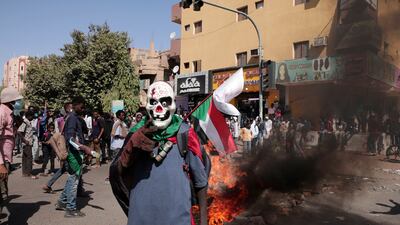Sudanese security forces on Tuesday fired tear gas at protesters chanting slogans against military rule, two days after civilian Prime Minister Abdalla Hamdok stepped down, deepening the country’s months-long political crisis.
Tuesday’s rallies in Khartoum, Omdurman and Bahri, along with several other cities across the country, are the 13th set of major demonstrations since army chief Abdel Fattah Al Burhan seized power in an October 25 coup that derailed Sudan’s democratic transition.
Unlike in some recent demonstrations, there were no attempts by the protesters to march on Khartoum’s Republican Palace, the seat of political power in Sudan.
Gen Al Burhan dismissed Mr Hamdok on the day the of the military takeover and placed him under house arrest. He reinstated him on November 21 and mandated him to form a Cabinet of independent technocrats.
A former UN economist, Mr Hamdok never formed that government and resigned on Sunday. In a televised address to the nation, a sombre Mr Hamdok cited a widening rift between the military and pro-democracy groups that had shared power in a transitional administration that took office in August 2019.
On Tuesday, protesters shouted "No to military rule!" They also chanted “the people are stronger, return is impossible!” and “soldiers back in their barracks!”.
There were also protests in the eastern city of Port Sudan on the Red Sea and in Nyala in the western Darfur region.
Security forces sealed off streets leading to the palace and army headquarters, both in central Khartoum. Thousands of troops, riot police and members of a government-sanctioned militia were deployed across the city.
Authorities, anticipating a smaller turnout than previous rallies, did not cut off the internet and mobile phone services as it routinely did in the past to deny organisers the ability to mobilise and co-ordinate.
There were no immediate reports of casualties in Tuesday’s protests.
At least 57 protesters have been killed and hundreds injured in the anti-military rallies since the coup.
UN envoy warns Sudan's army unable to run the country
The UN special envoy to Sudan, meanwhile, said in a media interview on Tuesday that the army was incapable of running the country and that new leaders are needed to prevent further unrest.
The generals are unable to salvage a democratic transition that was supposed to lead to free elections in 2023, Volker Perthes said. The process must be led by credible civilian politicians backed by the street, he said.
“The country is on a slippery slope,” said Mr Perthes, who met Gen Al Burhan in Khartoum on Tuesday. An official statement said the meeting reviewed the current political situation after Mr Hamdok’s resignation, but gave no details.
In New York, UN Secretary General Antonio Guterres condemned the use of violence against protesters and called on security forces to exercise the utmost restraint and respect the rights to freedom of assembly and expression.

“The secretary general has also taken note of the resignation of prime minister Abdalla Hamdok. He regrets that a political understanding on the way forward is not in place despite the gravity of the situation in Sudan,” Stephane Dujarric, a spokesman for the UN chief, said on Monday night.
“The secretary general encourages all stakeholders to continue engaging in meaningful dialogue in order to reach an inclusive, peaceful and lasting solution.”
Correspondent James Reinl In New York contributed to this report.





















